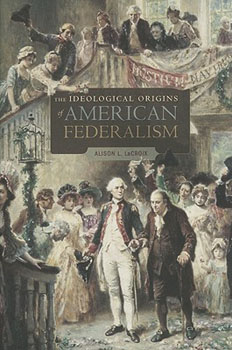| Sun | Mon | Tue | Wed | Thu | Fri | Sat |
|---|---|---|---|---|---|---|
| 1 | 2 | 3 | 4 | 5 | ||
| 6 | 7 | 8 | 9 | 10 | 11 | 12 |
| 13 | 14 | 15 | 16 | 17 | 18 | 19 |
| 20 | 21 | 22 | 23 | 24 | 25 | 26 |
| 27 | 28 | 29 | 30 | 31 |
CATEGORIES
RECENT ENTRIES
BLOG ROLL
Fed of state
The ideological origins of American Federalism—still important in America today and the title of a new book by a U of C law professor.
 The federal government won't be taking Arizona's new law allowing police to inquire about immigration status lying down, filing suit instead. Asserting that "a state may not establish its own immigration policy or enforce state laws in a manner that interferes with the federal immigration laws," the Justice Department's July 6 filing references the Constitution's Supremacy Clause, which says that federal law trumps conflicting state law.
The federal government won't be taking Arizona's new law allowing police to inquire about immigration status lying down, filing suit instead. Asserting that "a state may not establish its own immigration policy or enforce state laws in a manner that interferes with the federal immigration laws," the Justice Department's July 6 filing references the Constitution's Supremacy Clause, which says that federal law trumps conflicting state law.
The United States of America v. The State of Arizona is the latest flare-up in a long line of conflicts between the states and Washington, a history that doesn't just go back to the drafting of the Constitution and the Federalist Papers, but, as assistant law professor Alison LaCroix argues in a new book, to ideological debates in the 13 colonies as early as 1760.
The Ideological Origins of American Federalism covers the era from 1760 through though 1810, charting how Americans developed the country's unique brand of government out of struggles for self-representation, rather than developing political philosophy on the spur of the moment at the 1787 Constitutional Convention, as others have written. This approach shows just how resistant many of the colonists were to a strong federal government and that it's a mistake to think of state governments and their federal counterpart as being at odds, said LaCroix last Tuesday during a talk at the Quad Club.
 As politicians continue to cite the founding documents as proof that their positions are right and others' are wrong, LaCroix advocates a much less rigid approach, arguing that there was no clear consensus among the nation's founding fathers on who should have more power. Take the federal government's supremacy over states, for example, which is outlined in the Supremacy Clause as such: U.S. laws and treaties "shall be the supreme Law of the Land." While the government may see that as clear-cut and in favor of the federal government, states might have a more expansive view, LaCroix says. "Where does it say that federal power is exclusive?" There could be more of a role for shared power, even if the federal government is supreme, or more delegation of power.
As politicians continue to cite the founding documents as proof that their positions are right and others' are wrong, LaCroix advocates a much less rigid approach, arguing that there was no clear consensus among the nation's founding fathers on who should have more power. Take the federal government's supremacy over states, for example, which is outlined in the Supremacy Clause as such: U.S. laws and treaties "shall be the supreme Law of the Land." While the government may see that as clear-cut and in favor of the federal government, states might have a more expansive view, LaCroix says. "Where does it say that federal power is exclusive?" There could be more of a role for shared power, even if the federal government is supreme, or more delegation of power.
There's another reason politicians shouldn't name-drop the founding fathers for partisan gain—it's not in the spirit of the founding. "A lot of the participants [in today's debates] are focused on who wins," LaCroix says. "I think early federalist thinkers were willing to postpone the question [of who wins]; the background principle that they were really committed to was this multilayered government."
Nevertheless, LaCroix argues that at least the history of American federalism was pretty clear in the Arizona case. If you asked people in the 18th century what they thought federalism means, she says, they would have said that authority of the federal government is bound up in foreign affairs, "so that seems like something that you would cede to the federal government."
Asher Klein, '11
July 19, 2010
